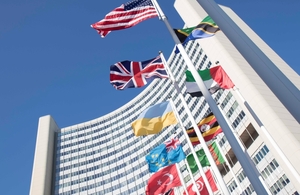Removing child sexual exploitation and abuse materials: call to action
This call, signed by 71* United Nations member states, supports efforts to proactively remove and combat child sexual exploitation and abuse material online.

The following member states* support urgent efforts to proactively remove and combat child sexual exploitation and abuse material online:
Albania, Algeria, Andorra, Armenia, Argentina, Australia, Bosnia and Herzegovina, Brazil, Canada, Chile, Colombia, Costa Rica, Ecuador, Egypt, El Salvador, Ghana, Guatemala, Honduras, Iceland, India, Japan, Kenya, Liechtenstein, Mexico, Moldova, Morocco, New Zealand, Norway, Pakistan, Paraguay, Peru, Philippines, Singapore, South Africa, Sudan, Switzerland, Thailand, Türkiye, Ukraine, United Kingdom, United States of America, Uruguay, Vietnam, Yemen and the European Union and its 27 member states (Austria, Belgium, Bulgaria, Croatia, Republic of Cyprus, Czech Republic, Denmark, Estonia, Finland, France, Germany, Greece, Hungary, Ireland, Italy, Latvia, Lithuania, Luxembourg, Malta, Netherlands, Poland, Portugal, Romania, Slovakia, Slovenia, Spain and Sweden.)
*Since its publication, Burkina Faso, Israel, Mongolia and Serbia have also joined the call to action.
In particular:
- the urgent need for action by governments, internet service providers and access providers, and other actors, to protect children from online sexual exploitation and abuse, and to facilitate a dialogue between the different entities and sectors required for an effective response
- the need for common data sets, for or among competent authorities, of known child sexual abuse materials, such as the International Criminal Police Organization (INTERPOL) International Child Sexual Exploitation database, for the purpose of detecting, reporting and removing materials, including images and videos of child sexual exploitation and abuse
- the need to increase public awareness of the serious nature of child sexual exploitation and child sexual abuse materials, how such materials constitute sexual offences against children and how the production, distribution and consumption of such materials put more children at risk of sexual exploitation and abuse, including by normalizing the conduct depicted in such materials and fuelling the demand for such materials
Member states and the private sector have a responsibility to take action to keep children safe from all forms of sexual exploitation and abuse. We recognise the devastating and long-lasting trauma that child sexual exploitation and abuse can inflict upon victims in particular:
- shame and stigma can silence those who have experienced child sexual exploitation and abuse, which adds to their suffering
- the risks of revictimisation and retraumatisation, including from the repeated circulation of material online
- that the creation, possession, dissemination, and consumption of child sexual abuse material puts children at risk of sexual exploitation and abuse, including by normalising the conduct depicted in such material and fuelling the demand for such material
We recognise that effective efforts, to prevent and tackle child sexual exploitation and abuse, depend on multi-stakeholder partnerships across the public and private sectors.
We note the growing efforts by member states, including through national or domestic legislation and strategies, and through relevant multilateral agreements, to prevent and combat the online sexual exploitation and abuse of children.
Find out more: 71 countries call to remove online child sexual abuse materials.